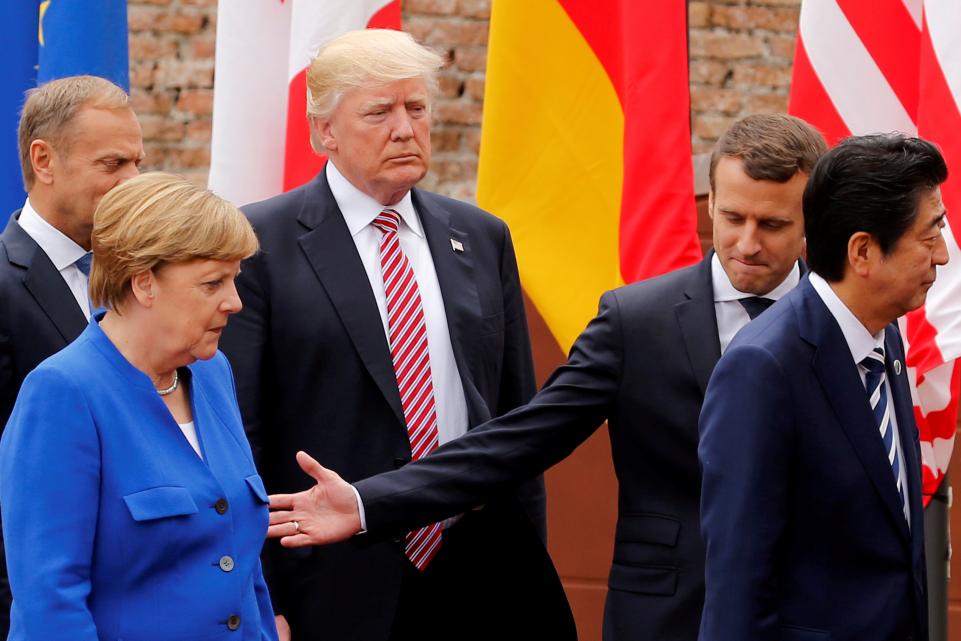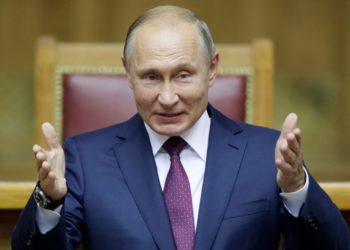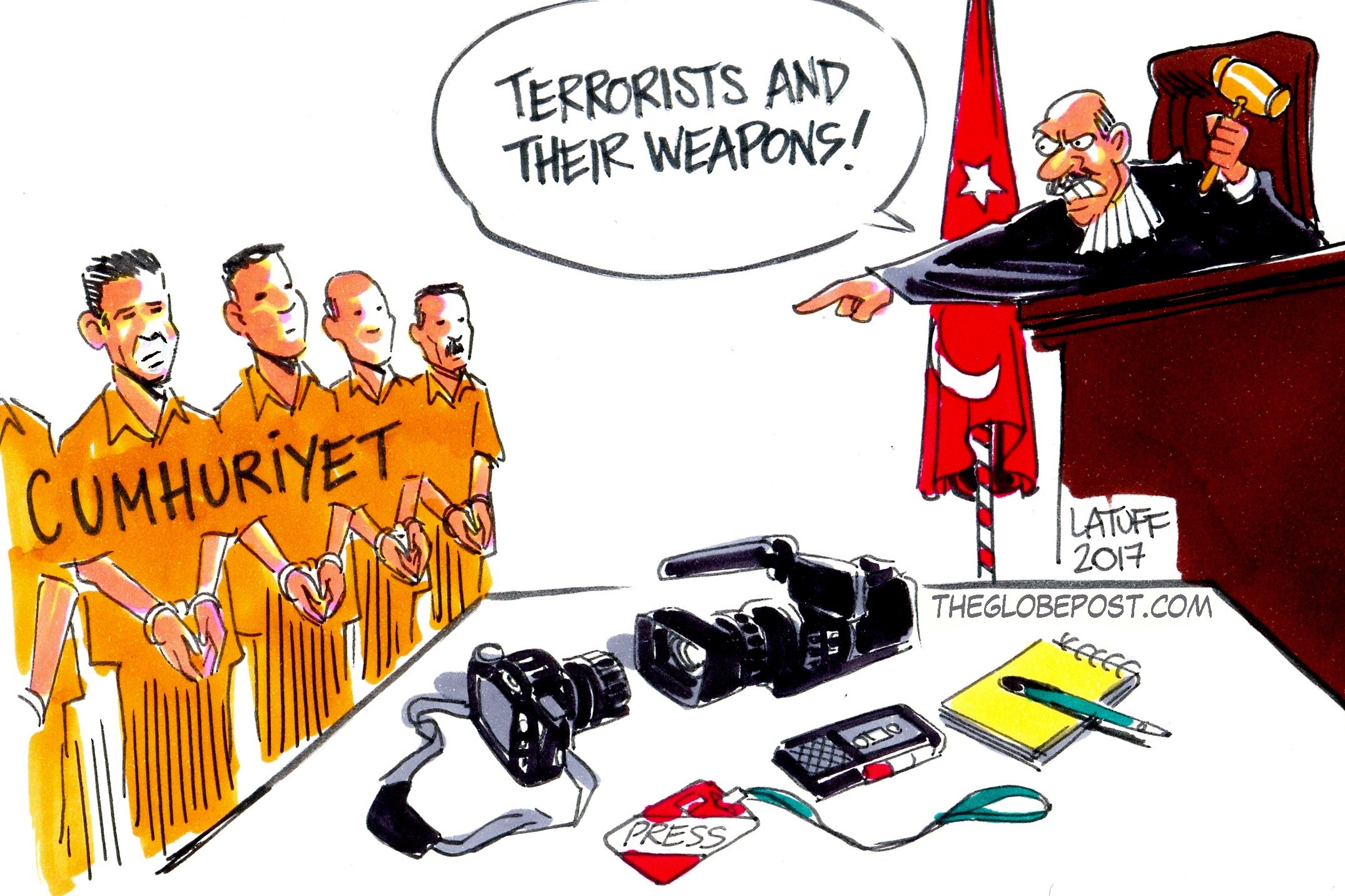Six months into his presidency, Donald J. Trump’s record-breaking low approval rating is not that different from his favorability ratings abroad. Unable to adopt a single legislative action since his inauguration, low favorability ratings in the world, including in some of U.S. allies, are poised to threaten American national interests.
A recent Pew Research Center survey showed that Mr. Trump and several of his policies are widely unpopular around the world, especially his travel ban targeting some Muslim-majority countries and U.S. withdrawal from the Paris climate deal.
Among 37 nations surveyed, only a median of 22 percent is confident in Mr. Trump, while this number during Barack Obama’s presidency was 64 percent.
The U.S. president’s unpopular image also contributed to a lower rating for the nation. Currently only a median of 49 percent has a positive view of the U.S., compared to 64 percent when Mr. Obama was in office. The charm Mr. Obama enjoyed during his early months of his presidency is absent during the Trump era.
Europe Rides on Anti-Trump Wave
The sharpest declines in U.S. image are especially found among some of America’s long-time allies in Europe, where Mr. Trump’s ratings dropped to the George W. Bush era in 2008.
At the recent G20 summit in Hamburg, Mr. Trump was left alone when every other country leader signed a declaration emphasizing the Paris climate deal is irreversible.
In June, Mr. Trump pulled the U.S. out of the Paris agreement, drawing rebuke from allies such as France and Germany. Newly elected French President Emmanuel Macron condemned his decision and offered American scientists to take refuge in France.
“To all scientists, engineers, entrepreneurs, responsible citizens who were disappointed by the decision of the president of the United States, I want to say that they will find in France a second homeland,” Mr. Macron said during a live broadcast.
He is not alone. Key leaders in Europe were ready to name their differences from Mr. Trump in increasingly blunt terms.
Jan Techau, director of the Richard Holbrooke Forum at the American Academy in Berlin, told the New York Times, “there is now a more openly confrontational language with the United States.” He noted that the European public is already outspoken about Mr. Trump, but now there is a more outspoken European leadership that won’t paper over these divisions anymore.
Shortly after Mr. Trump’s visit to Europe in May, German Chancellor Angela Merkel –- a close collaborator with Mr. Obama –- has expressed her concerns on E.U.-U.S. relations.
“The times in which we could completely depend on others are on the way out,” she said during a public speech, a remarkable confession from an allied country. “I’ve experienced that in the last few days.”
Despite mocking Mr. Trump’s decision to pull out the climate deal, Mr. Macron appears to assume the role of a leader trying to sustain Trans-Atlantic relationship. On July 14, he hosted Mr. Trump in Paris for Bastille Day celebrations.
Whether this invitation would lead to a closer cooperation between the two countries remains to be seen.
Mr. Trump’s low ratings around the world have already started taking a toll on his visits. Last month, he had to postpone his scheduled visit to Britain, a country where Mr. Trump is disliked by the vast majority of the people, due to expected protests.
Middle East: Mixed Signals
Ironically, Mr. Trump’s first foreign visit was to Saudi Arabia, despite his long record of bashing Muslims throughout his electoral campaign. There, he lectured Muslim leaders and called them to reject extremists from their countries.
Mr. Trump refused to give a speech reaching out to Muslims, the one delivered by George W. Bush in Istanbul and Mr. Obama in Cairo.
Joe Macaron, a policy analyst at Washington’s Arab Center, thinks Middle East’s view of Mr. Trump is similar to how the world views him.
“Since the campaign, the Middle East is already skeptical of his policy in general. Now they can match it with the face,” he told The Globe Post.
In addition, Mr. Trump’s bold tweets and statements often baffled U.S. policy makers as well as foreign leaders. “There is confusion and this is not helping the world, especially the Middle East,” Mr. Macaron said.
As a result, a divide has emerged between the White House and the State Department on a series of issues.
One prime example is the ongoing Gulf crisis. Mr. Trump tweeted: “During my recent trip to the Middle East I stated that there can no longer be funding of Radical Ideology. Leaders pointed to Qatar –look!”
U.S. Secretary of State Rex Tillerson then, however, tried to ease the tensions between Saudi-led bloc and Qatar, requesting Saudi to “ease the blockade” and flying to Kuwait to explore ways to resolve the crisis.
Different from Obama administration, Mr. Trump is strengthening ties with traditional Middle East allies, including Saudi Arabia, Israel, and Egypt, while taking a strong stand against Iran.
The Pew report showed his high rating in Israel, which is the only country in the Middle East that more than half of the participants have a positive opinion of him.
Mr. Macaron suggests it is still too early to define Mr. Trump’s doctrine. A positive sign is that Mr. Trump is letting the Pentagon make most of the decisions regarding the Middle East, especially the military ones, which helps the region to remain stable, Mr. Macaron added.
China: Surprisingly Welcome
Mr. Trump is mysteriously popular among Chinese, especially netizens on social media, despite his anti-China rhetoric that constituted a cornerstone of his electoral campaign.
Nicholas Hope, former director of the Stanford Center for International Development, says “his image in China is not nearly so negative, as he is in Europe, where he was [viewed] as someone who is swimming against the flow of opinions.”
Mr. Trump has made some controversial moves regarding the “One China policy,” particularly when he spoke on the phone with Taiwan’s leader.
But after hosting Chinese President Xi Jinping at his Mar-a-Lago golf resort, he tends to be more cautious in his approach to China, especially in areas concerning trade.
“Although he had talked aggressively before he became the president, he is tuned-down,” Mr. Hope told The Globe Post. “I think a lot of Chinese are quite relieved to see he is somebody that seems think well of President Xi and open to negotiate constructively with China.”
The recent U.S.-China trade deal was hailed by Mr. Xi as a “win-win” cooperation. The deal opened the Chinese market to U.S. credit rating agencies and credit card companies, and welcome the imports of U.S. beef after a 14-year ban.
Mr. Trump’s withdrawal from the Paris climate deal also benefits China, as it enables President Xi to take the lead on climate change with a strong support of the Europeans and other countries.
Since his start to the presidency, Mr. Trump had this idea that he could talk China into curbing North Korea’s aggressive activities. Disappointed, the U.S. moved to impose sanctions on several Chinese companies, struck an arms deal with Taiwan and increased navy presence in disputed South China Sea. Despite the escalating tensions, Mr. Hope remains optimistic about the U.S.-China relationship.
He suggested: “I would be more confident of my opinion if President Trump is more predictable than he seems to be.”
“I am actually relying on President Xi along with some enlightened leadership from the Europeans to try to ensure that the American position does become one that is accepted internationally,” Mr. Hope said, adding that he believes in cooperation internationally.
“Not American first, or anybody first.”
Pew survey also revealed that the U.S. favorability ratings have increased only in Russia and Vietnam.
In Russia, the popularity of the Obama administration had plummeted after the 2014 Ukrainian crisis. In contrast, despite the ongoing investigations into Trump’s campaign and alleged Russian meddling in U.S. elections, Mr. Trump gets the highest marks than Mr. Obama or Mr. Bush ever did.
Mexico and Canada had witnessed a dramatic decrease in confidence in a U.S. president, reaching the lowest ratings of any U.S. leaders.





















